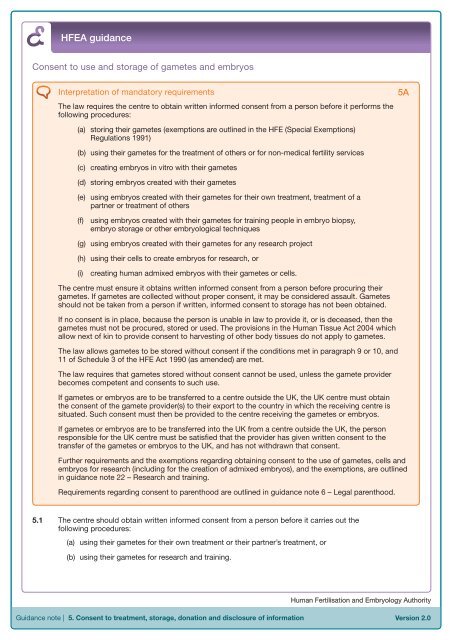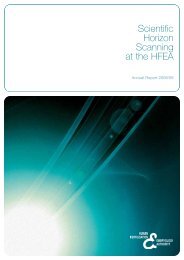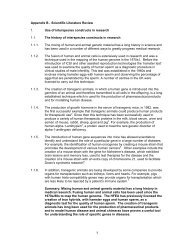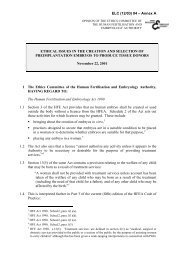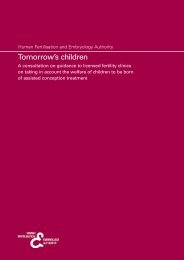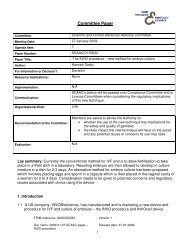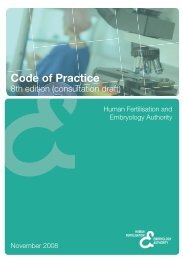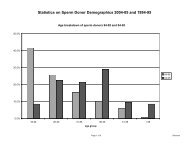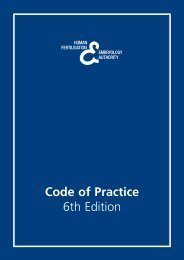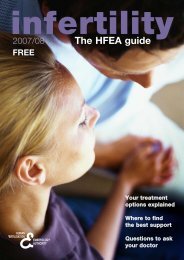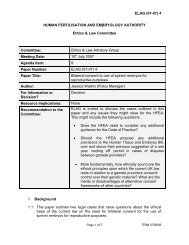Eighth Edition - R.3 - Human Fertilisation & Embryology Authority
Eighth Edition - R.3 - Human Fertilisation & Embryology Authority
Eighth Edition - R.3 - Human Fertilisation & Embryology Authority
Create successful ePaper yourself
Turn your PDF publications into a flip-book with our unique Google optimized e-Paper software.
HFEA guidance<br />
Consent to use and storage of gametes and embryos<br />
Interpretation of mandatory requirements<br />
The law requires the centre to obtain written informed consent from a person before it performs the<br />
following procedures:<br />
5A<br />
(a)<br />
(b)<br />
(c)<br />
(d)<br />
(e)<br />
(f)<br />
(g)<br />
(h)<br />
(i)<br />
storing their gametes (exemptions are outlined in the HFE (Special Exemptions)<br />
Regulations 1991)<br />
using their gametes for the treatment of others or for non-medical fertility services<br />
creating embryos in vitro with their gametes<br />
storing embryos created with their gametes<br />
using embryos created with their gametes for their own treatment, treatment of a<br />
partner or treatment of others<br />
using embryos created with their gametes for training people in embryo biopsy,<br />
embryo storage or other embryological techniques<br />
using embryos created with their gametes for any research project<br />
using their cells to create embryos for research, or<br />
creating human admixed embryos with their gametes or cells.<br />
The centre must ensure it obtains written informed consent from a person before procuring their<br />
gametes. If gametes are collected without proper consent, it may be considered assault. Gametes<br />
should not be taken from a person if written, informed consent to storage has not been obtained.<br />
If no consent is in place, because the person is unable in law to provide it, or is deceased, then the<br />
gametes must not be procured, stored or used. The provisions in the <strong>Human</strong> Tissue Act 2004 which<br />
allow next of kin to provide consent to harvesting of other body tissues do not apply to gametes.<br />
The law allows gametes to be stored without consent if the conditions met in paragraph 9 or 10, and<br />
11 of Schedule 3 of the HFE Act 1990 (as amended) are met.<br />
The law requires that gametes stored without consent cannot be used, unless the gamete provider<br />
becomes competent and consents to such use.<br />
If gametes or embryos are to be transferred to a centre outside the UK, the UK centre must obtain<br />
the consent of the gamete provider(s) to their export to the country in which the receiving centre is<br />
situated. Such consent must then be provided to the centre receiving the gametes or embryos.<br />
If gametes or embryos are to be transferred into the UK from a centre outside the UK, the person<br />
responsible for the UK centre must be satisfied that the provider has given written consent to the<br />
transfer of the gametes or embryos to the UK, and has not withdrawn that consent.<br />
Further requirements and the exemptions regarding obtaining consent to the use of gametes, cells and<br />
embryos for research (including for the creation of admixed embryos), and the exemptions, are outlined<br />
in guidance note 22 – Research and training.<br />
Requirements regarding consent to parenthood are outlined in guidance note 6 – Legal parenthood.<br />
5.1 The centre should obtain written informed consent from a person before it carries out the<br />
following procedures:<br />
(a)<br />
using their gametes for their own treatment or their partner’s treatment, or<br />
(b) using their gametes for research and training.<br />
<strong>Human</strong> <strong>Fertilisation</strong> and <strong>Embryology</strong> <strong>Authority</strong><br />
Guidance note | 5. Consent to treatment, storage, donation and disclosure of information<br />
Version 2.0<br />
1.0


